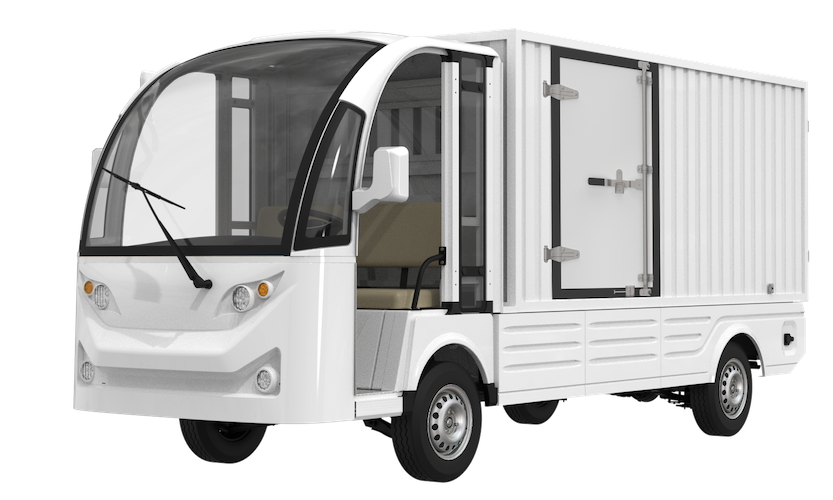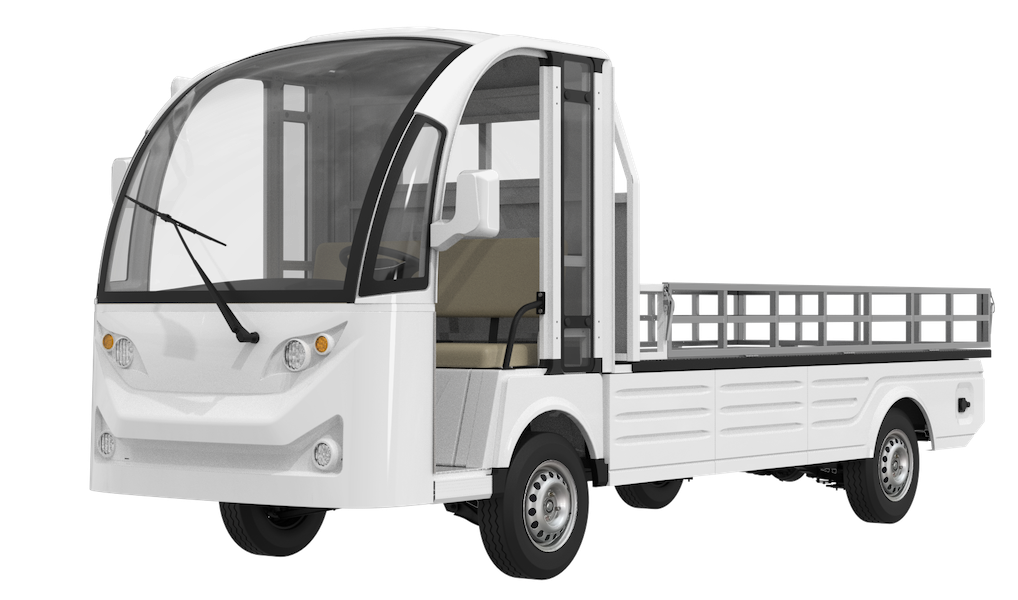Content Menu
● The Rise of Electric Cargo Vehicles in Europe
● Leading Electric Cargo Vehicle Manufacturers and Suppliers
>> Daimler Truck AG
>> Volvo Group
>> MAN SE (Volkswagen AG)
>> Renault Trucks
>> Scania AB
>> BYD Co. Ltd
>> IVECO SpA
>> Volta Trucks
>> Einride AB
>> Tevva Motors Limited
>> E-Trucks Europe BE
>> E-Force One AG
>> Alke'
>> Other Notable Players
● Market Trends and Innovations
● Applications and Use Cases
● Challenges Facing Electric Cargo Vehicle Manufacturers and Suppliers
● Conclusion
● FAQ
>> 1. What are the main benefits of choosing electric cargo vehicles for logistics operations?
>> 2. How do electric cargo vehicle manufacturers and suppliers address charging infrastructure challenges?
>> 3. Which sectors benefit most from electric cargo vehicles in Europe?
>> 4. What factors should buyers consider when selecting an electric cargo vehicle?
>> 5. What is the future outlook for electric cargo vehicle manufacturers and suppliers in Europe?
The European market for electric cargo vehicles is undergoing a profound transformation, fueled by increasing environmental awareness, technological advancements, and the rising demand for sustainable urban logistics. As e-commerce continues to expand and cities implement stricter emission regulations, electric cargo vehicles have emerged as a vital solution for reducing carbon footprints while maintaining efficient delivery networks. This article provides an in-depth look at the top electric cargo vehicle manufacturers and suppliers in Europe, highlighting their innovations, product offerings, and the evolving trends shaping this dynamic industry.

The Rise of Electric Cargo Vehicles in Europe
Europe's commitment to achieving net-zero emissions and improving air quality has accelerated the adoption of electric cargo vehicles. Urban centers across the continent are introducing low-emission zones and incentivizing green transportation alternatives, making electric cargo vehicles an essential component of modern logistics.
These vehicles range from compact electric vans suitable for last-mile deliveries to heavy-duty trucks designed for regional and urban freight transport. Their ability to operate quietly and without tailpipe emissions makes them especially attractive for densely populated areas where noise and pollution are critical concerns.
The growing infrastructure supporting electric vehicles, including widespread charging stations and government subsidies, further bolsters the market. Additionally, the continuous improvement in battery technology—resulting in longer ranges and shorter charging times—is addressing previous limitations, making electric cargo vehicles increasingly viable for a broad spectrum of logistics applications.
Leading Electric Cargo Vehicle Manufacturers and Suppliers
Daimler Truck AG
Daimler Truck AG is a titan in the commercial vehicle sector and has made significant investments in electrification. The Mercedes-Benz eActros is a flagship heavy-duty electric truck designed specifically for urban distribution, offering a range suitable for daily delivery routes and zero emissions. Additionally, the FUSO eCanter, a light-duty electric truck, has been well-received for its versatility and reliability. Daimler's extensive experience in vehicle manufacturing, combined with its focus on sustainability, positions it as a leader among electric cargo vehicle manufacturers and suppliers in Europe.
Volvo Group
Volvo Group has been a pioneer in integrating electric powertrains into commercial vehicles. Their electric trucks, such as the Volvo FL Electric and Volvo FE Electric, cater to urban logistics and refuse collection, where zero emissions and quiet operation are paramount. Volvo emphasizes safety, driver comfort, and operational efficiency, making their electric cargo vehicles popular choices for fleet operators seeking sustainable solutions.
MAN SE (Volkswagen AG)
As part of the Volkswagen Group, MAN SE has developed a strong lineup of electric trucks aimed at urban and regional logistics. The MAN eTGM and MAN eDelivery models feature cutting-edge battery technology and efficient electric drivetrains. MAN's vehicles are designed to meet the demanding requirements of commercial logistics, offering robust payload capacities and reliability while contributing to emission reduction goals.
Renault Trucks
Renault Trucks offers a wide range of electric cargo vehicles, from compact vans like the Renault Master Z.E. to heavier models such as the Renault D Z.E. These vehicles are optimized for last-mile delivery and urban transport, addressing the increasing demand for clean, quiet, and efficient logistics solutions. Renault's commitment to electric mobility is evident in its continuous expansion of the electric vehicle portfolio.
Scania AB
Scania AB integrates electric powertrains across various truck models, focusing on sustainability and operational efficiency. Their electric trucks serve multiple purposes, including urban delivery and regional haulage, with an emphasis on reducing total cost of ownership. Scania's approach combines electrification with digital solutions to optimize fleet management and logistics operations.
BYD Co. Ltd
BYD, a major Chinese manufacturer, has successfully entered the European market with a range of electric commercial vehicles. Leveraging its expertise in battery technology, BYD offers electric vans, trucks, and buses tailored to European standards and customer needs. BYD's vehicles are recognized for their reliability, long range, and competitive pricing, making them a strong competitor among electric cargo vehicle manufacturers and suppliers.

IVECO SpA
IVECO has made significant strides in electrifying its commercial vehicle lineup, particularly focusing on urban and regional distribution. Its electric vans and trucks are designed to meet the rigorous demands of modern logistics, emphasizing low emissions, operational efficiency, and driver comfort. IVECO's commitment to sustainable transport solutions is reflected in its growing portfolio of electric vehicles.
Volta Trucks
Volta Trucks is a relatively new but innovative player specializing in fully electric trucks designed for urban logistics. The Volta Zero, their flagship model, offers a spacious cargo area, advanced safety features, and zero emissions, making it ideal for city deliveries. Volta Trucks focuses on sustainability and safety, aiming to revolutionize urban freight transport.
Einride AB
Einride AB is at the forefront of combining electric mobility with autonomous driving technology. Their electric trucks are designed to operate autonomously or with remote drivers, providing innovative solutions for efficient and sustainable freight transport. Einride's approach represents the future of logistics, where automation and electrification converge.
Tevva Motors Limited
Tevva Motors develops hybrid and electric trucks that integrate battery and hydrogen fuel cell technologies. This hybrid approach addresses range limitations and supports long-distance logistics with reduced emissions. Tevva's vehicles are designed for medium-duty transport, offering flexibility and sustainability for diverse applications.
E-Trucks Europe BE
E-Trucks Europe BE focuses on developing electric trucks that comply with European regulations and standards. Their vehicles are engineered for efficiency and sustainability, with a strong emphasis on drivetrain optimization and environmental responsibility. E-Trucks Europe BE is gaining recognition among electric cargo vehicle manufacturers and suppliers for its tailored solutions.
E-Force One AG
E-Force One AG specializes in producing customized electric trucks for heavy-duty applications. Their niche focus allows them to meet specific industry needs, such as construction, waste management, and industrial logistics, where robust electric vehicles are essential. E-Force One AG combines innovation with practical design to serve demanding logistics sectors.
Alke'
Alke' is known for manufacturing powerful, reliable electric utility vehicles and cargo vans capable of operating in challenging environments. Their vehicles are widely used in urban, industrial, and off-road applications, offering flexibility and sustainability. Alke's electric cargo vehicles are a popular choice for specialized logistics tasks.
Other Notable Players
Several other manufacturers contribute to the vibrant landscape of electric cargo vehicles in Europe. Companies like DAF Trucks NV, Tesla Motors, Ford Motor Company, and emerging startups such as Aucwell, Regis Motors, and REE Automotive continue to innovate and expand the market. These players offer a diverse range of electric cargo vehicles, from light vans to heavy-duty trucks, catering to various logistics and transportation needs.
Market Trends and Innovations
The electric cargo vehicle market in Europe is shaped by several key trends and innovations:
- Sustainability and Circular Economy: Manufacturers are incorporating eco-friendly materials and designing vehicles with recyclability in mind to reduce environmental impact throughout the lifecycle.
- Battery Advancements: Improvements in energy density, charging speed, and battery management systems are enabling longer ranges and faster turnaround times, critical for commercial operations.
- Autonomous and Connected Vehicles: Integration of autonomous driving technologies and connectivity features enhances safety, optimizes routes, and reduces operational costs.
- Fleet Digitization: Digital platforms for fleet management provide real-time data on vehicle performance, energy consumption, and maintenance needs, improving efficiency and uptime.
- Urban Logistics Focus: Electric cargo vehicles are increasingly tailored for last-mile delivery, addressing challenges such as congestion, noise pollution, and air quality in cities.
- Government Support and Regulations: Incentives, subsidies, and regulations promoting zero-emission vehicles accelerate market adoption and encourage manufacturers to innovate.
Applications and Use Cases
Electric cargo vehicles are versatile and find applications across multiple sectors:
- Urban Delivery Services: Ideal for last-mile delivery of parcels, groceries, and other goods within city limits, where zero emissions and low noise are essential.
- Regional Freight Transport: Medium-duty electric trucks serve regional distribution centers, supporting sustainable supply chains.
- Municipal and Public Services: Electric vehicles are used for waste collection, street cleaning, and maintenance, reducing environmental impact in urban areas.
- Construction and Industrial Logistics: Customized electric trucks handle materials and equipment transport within industrial sites and construction zones.
- Airport and Port Operations: Electric cargo vehicles facilitate logistics in airports and ports, where emissions regulations are strict and operational efficiency is critical.
- E-commerce Fulfillment: The surge in online shopping has increased demand for electric cargo vehicles to support fast, eco-friendly deliveries.
Challenges Facing Electric Cargo Vehicle Manufacturers and Suppliers
Despite promising growth, the industry faces several challenges:
- Charging Infrastructure Development: The expansion and standardization of fast-charging networks remain essential to support large fleets and long-distance operations.
- High Initial Costs: Electric cargo vehicles often have higher upfront prices than diesel counterparts, although lower operating costs and incentives help offset this.
- Range and Payload Limitations: Battery weight and capacity can limit payload and range, particularly for heavy-duty applications, necessitating ongoing technological improvements.
- Supply Chain Constraints: Global shortages of batteries, semiconductors, and raw materials can affect production schedules and vehicle availability.
- Technological Integration: Incorporating autonomous systems, connectivity, and fleet management tools requires significant investment and expertise.
- Market Education and Acceptance: Some fleet operators remain cautious about transitioning to electric vehicles due to concerns about reliability, maintenance, and resale value.
Conclusion
The European electric cargo vehicle market is vibrant and rapidly evolving, driven by environmental imperatives, technological breakthroughs, and changing logistics demands. Leading manufacturers and suppliers are continuously innovating to deliver vehicles that meet the diverse needs of urban and regional freight transport while adhering to strict sustainability goals. Although challenges remain, the outlook for electric cargo vehicles in Europe is overwhelmingly positive. As infrastructure improves and technology advances, electric cargo vehicles will become indispensable assets in creating cleaner, quieter, and more efficient logistics networks across the continent.

FAQ
1. What are the main benefits of choosing electric cargo vehicles for logistics operations?
Electric cargo vehicles provide numerous advantages, including zero tailpipe emissions, lower operating and maintenance costs, reduced noise pollution, and compliance with increasingly strict urban emission regulations. They also enhance corporate sustainability credentials and enable access to restricted low-emission zones.
2. How do electric cargo vehicle manufacturers and suppliers address charging infrastructure challenges?
Manufacturers collaborate with energy providers, governments, and private partners to expand charging networks. They also develop integrated fleet management systems that optimize charging schedules and routes, ensuring vehicles remain operational and minimizing downtime.
3. Which sectors benefit most from electric cargo vehicles in Europe?
Sectors such as e-commerce, retail, municipal services, urban delivery, and regional logistics benefit significantly from electric cargo vehicles due to their efficiency, environmental benefits, and suitability for operating in emission-restricted zones.
4. What factors should buyers consider when selecting an electric cargo vehicle?
Buyers should evaluate vehicle range, payload capacity, charging time, total cost of ownership, after-sales service, compatibility with fleet management systems, and the availability of charging infrastructure to ensure the vehicle meets operational requirements.
5. What is the future outlook for electric cargo vehicle manufacturers and suppliers in Europe?
The future is promising, with continued growth expected as battery technology improves, costs decline, and regulatory frameworks support zero-emission transport. Manufacturers and suppliers will likely introduce more advanced, versatile, and affordable electric cargo vehicles, accelerating adoption across industries.










































